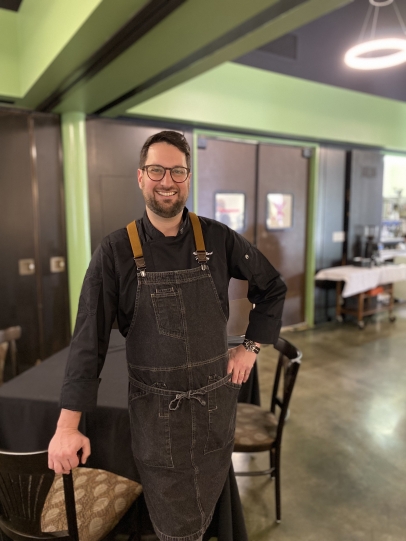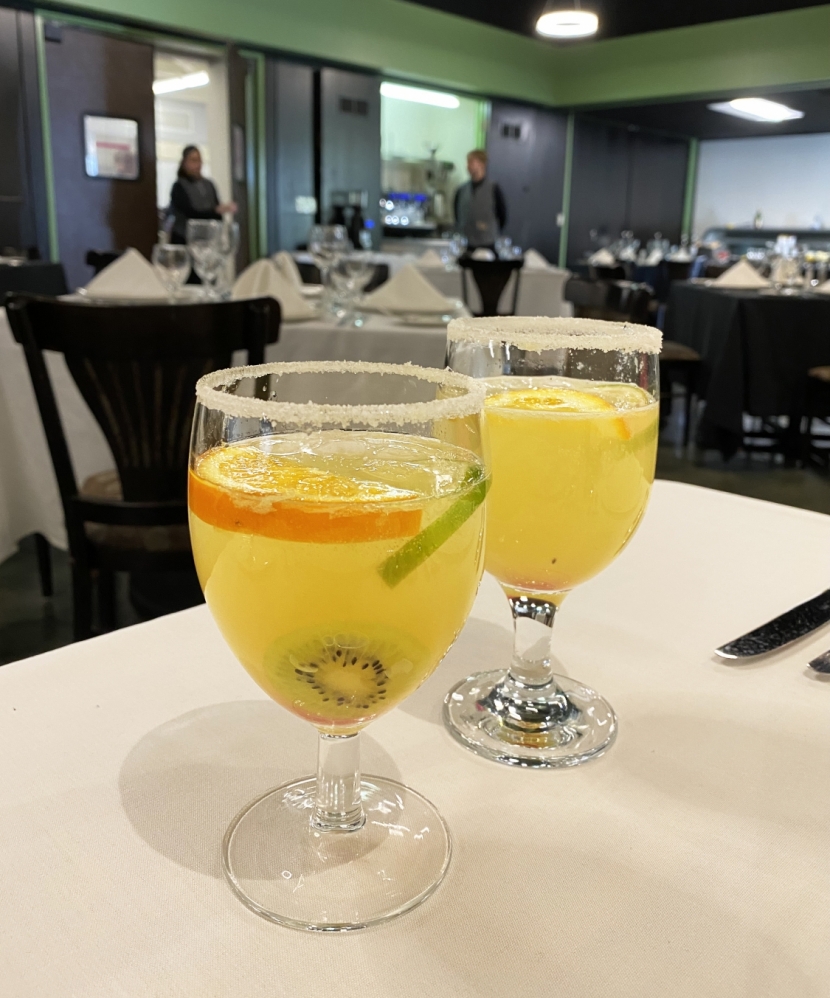An Appetite for Learning
Adam Hart has a problem: He can’t stop learning new things and earning credentials to prove it. Chef Hart runs the culinary program at Oxnard College, and I first noticed the issue on his online profile for Ventura County Community College District, which lists a bachelor’s degree in psychology, a Master of Business Administration (MBA) and an Associate of Occupational Studies (AOS) degree in culinary arts. It is a combination that struck me as both highly unusual and wildly applicable to the peculiar demands of the restaurant world. Still, his professional ambitions didn’t start in that realm.
Following college, where he obtained a bachelor of sciences in Psychology from Chapman University, Hart worked at a nonprofit in San Francisco providing education for individuals with developmental disabilities. On the side, he started teaching classes in cooking, a hobby cultivated from time in the kitchen with his mother and grandmother. This eventually led him to apply to culinary school at the California Culinary Academy (CCA), where he “fell in love with cooking.”
His realization that any restaurant needed commercial success as well as culinary success then led him to business school. There, he made a connection that took him back to the world of food—this time in a chef-instructor role. Landing the post surprised him, given his comparative lack of industry experience, and while he loved it, he eventually decided to move back to Los Angeles and get more time out of the classroom.
Hart did do restaurant work in Los Angeles but, fitting for a person who had thus far earned three degrees, he couldn’t stay away from education for long. He joined a nonprofit startup, the now-closed L.A. Kitchen, as director of education. Founded by Robert Egger and with a board that included World Central Kitchen founder and chef José Andrés and Tender Greens executive chair and founder Erik Oberholtzer, the idea at L.A. Kitchen was to build a culinary training program for people coming out of incarceration and aging out of the foster care system while providing food for the elderly.
Reflecting on this period at L.A. Kitchen, Hart says, “It was a really beautiful time being able to work in that sector and really feel like you’re helping people. I didn’t get that feeling again until I came here [Oxnard College] because the demographic here is different than the demographic when I was teaching at Le Cordon Bleu—significantly different.”
Students in the Oxnard College program are both young and old, including some who are previously retired, with demographics Hart likens to those of the city of Oxnard. But more than demographics, Hart describes the difference as coming down to one word: passion. The “students have a drive ... they didn’t just see a commercial and want to give it a try.”
To back up, Hart’s extensive resumé also includes a chef-instructor role at the Pasadena campus of the storied Le Cordon Bleu culinary program. When Le Cordon Bleu shut down in 2016, Hart made the leap to his current role at Oxnard College, bringing several Le Cordon Bleu instructors with him.
At Oxnard College, Hart has brought the full breadth of his education to inform the culinary arts program’s curriculum. “We’re going to do the industry-specific business stuff: We’re going to do SWOT [strength, weakness, opportunity, threat] analysis and food cost percentages. But we’re also going to spend a few weeks talking about different personality types and how to deal with them in the kitchen.” Cue Hart’s psychology degree.
During COVID restrictions, Hart’s own psychology—namely his tenacity with Sacramento and filing paperwork—helped keep the program running while much of the education system shut down. Lectures went online but labs remained in-person.
“The rest of the industry was out there working. We were training for the industry. There shouldn’t be that hypocrisy where we are training you to work in the industry, but we need to shut down.”
Even as COVID kept him busy trying to reduce its disruption of the program, Hart cites pandemic boredom (and a passion for wine studies) to explain why he undertook the daunting process of certifying as a sommelier through the Court of Master Sommeliers during this same period. He and his wife were also expecting their second daughter, and he figured it was then or never.
True to form, Hart has drawn on his sommelier certification and built an Introduction to Wine course for the Fall 2023 term. It is the first time the college has offered a wine course of any kind, and he sees it as opening the door for students to work in industries prevalent in Ventura and Santa Barbara counties, including wineries, distilleries and their associated tasting rooms and kitchens. Recognizing the course may also be of interest to the broader community, it is held on a Monday night and has no prerequisites, other than a minimum age of 21.
In the least surprising moment of our interview, Hart let slip that the arrival of his second daughter didn’t put a stop to his habit of following his curiosity to a certified level of expertise. He earned a Wine & Spirt Education Trust (WSET) Level One Award in sake following her birth, and he plans to bring this experience into the college’s gourmet and wine classes.
The public can also partake in the bounty of Hart’s knowledge and his students’ skills by dining in the on-campus bistro, which is run by students and staff as part of the college’s culinary program. After a lunch-service-only offering in the spring, the bistro switches to a Thursday night dinner service this fall.
Hart is enthusiastic about the symbiotic relationship between the bistro and the public, whose patronage allows students to get hands-on experience in a restaurant setting while the community gets a delicious meal for excellent value.
“The relationship between our students, this dining room and the wonderful people of Ventura who come out of their way after work or whenever—that is really something. ... It is really beautiful what this community does for us.”
And Hart is equally proud of his students. Asked about some success stories from the college’s culinary program, he shares two quite different examples. One is Chris McConathy, who, after a lengthy career in the insurance industry, enrolled in the Oxnard program, went on to work at the esteemed Ojai Valley Inn, and now runs her own catering business, Olive2Cook.
The other is an unnamed student who didn’t pursue cooking professionally, but instead uses their experience from the program to prepare meals for their aging family. Hart wells up as he recounts this student’s feedback that “I get to cook for my family the stuff that I was taught here, and I really appreciate that, and my family appreciates it.”
Like Hart, both students are using education to enrich the lives of others, each in their own unique and valuable way. His students are also finding success not just at restaurants and hotels but also preparing food at assisted living facilities and in grocery stores, the latter of which tend to have more sustainable work hours.
“You don’t realize how many different avenues there are in this industry,” Hart says. He has the conviction of a man who knows this firsthand—and the credentials to prove it.
LEARN MORE ABOUT:
-
Oxnard College’s culinary arts, restaurant management and hospitality management classes www.oxnardcollege.edu/departments/academic/culinary-artsrestaurant-management. Book a table at the bistro by emailing ocbistro@vcccd.edu.
-
Cork It Over www.corkitover.com, the wine and sake consulting service Hart runs in his spare time
-
Olive2Cook Catering & Baking www.yelp.com/biz/olive2cook-catering-and-baking-ventura, a venture run by a former student in the Oxnard College program
-
Cork Dork www.corkdorkwinebar.com, one of Hart’s Ventura County restaurant recommendations and an employer of some of the program’s students
-
Porto’s Bakery & Café, https://www.portosbakery.com, a favorite of Hart’s and an employer of some of the program’s students
-
Ventura Townehouse www.venturatownehouse.com, a retirement community that has gifted stipends to the culinary program to help cover students’ incidental expenses and employs some of the students











